15 Foods Experts Say You Should Stop Eating Today

Do you ever feel like your diet is holding you back from optimal health? You're not alone. Dr. Nick Zyrowski, D.C, B.S., a doctor and clinician, is on a mission to help people transform their health naturally. With his expertise in nutrition and wellness, Dr. Zyrowski shares insights on the foods we should avoid for better health. Joining him are other experts like Dr. Mark Hyman, a pioneering functional medicine physician, and Kaytee Hadley, MS, RDN, IFMCP, CPT, a functional medicine dietitian. Together, these health gurus reveal the top foods that might be sabotaging your well-being. Read on to discover which foods you should eliminate from your diet today — your body will thank you for it!
Ditch the Bleached White Flour and Refined Grains

Dr. Zyrowski warns against consuming bleached white flour and refined grains. "This is a grain that's gone through a process where the nutrient-rich wheat kernel has been removed, and so any vitamins and minerals it may have had to begin with are now gone," he explains in his post. These processed grains are often treated with chemicals like benzoyl peroxide and chlorine. Found in many staple foods like bread, pasta, and crackers, these refined grains are far from being real, nutritious food.
Say Goodbye to Low-Fat Foods
Contrary to popular belief, low-fat foods are not the answer to a healthy diet. Dr. Zyrowski debunks this myth, stating, "The idea that we should eat low-fat foods is probably one of the biggest lies ever pushed on people." He reminds us that our brain is 80% fat, and our body's cells have fatty membranes. Instead of low-fat options, he recommends full-fat alternatives like raw almond butter, plain full-fat yogurt, and whole milk from grass-fed cows.
Avoid Processed Deli Meats
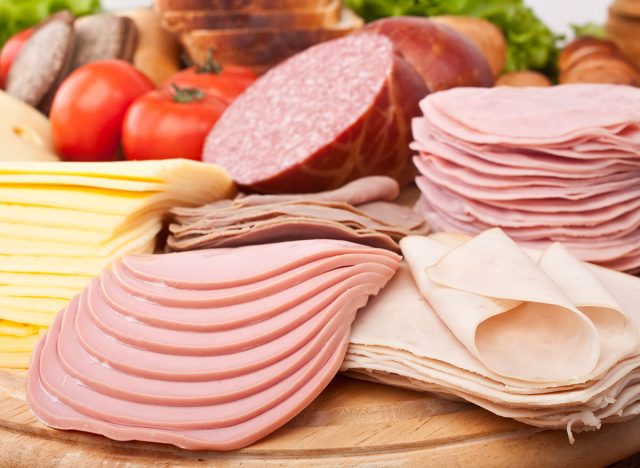
Deli meats often contain hidden ingredients that can be harmful to your health. "Deli meats can be loaded with a lot more ingredients than you ever bargained for," cautions Dr. Zyrowski. These processed meats often contain added sodium, nitrates, artificial flavorings, and even corn syrup. He suggests opting for whole, unprocessed meats instead.
Cut Out Sugary Drinks

Sugary beverages are a major culprit in poor health. Dr. Zyrowski warns, "There's not a better way to create a problem like insulin resistance in your body than drinking these types of beverages." This includes not just sodas but also fruit juices, sweetened teas, and energy drinks. He recommends choosing water, sparkling water, or stevia-sweetened beverages instead.
Eliminate Sugary Foods

Dr. Zyrowski underlines the dangers of sugar, noting that many people may have insulin resistance without realizing it. He advises avoiding foods like cereals, snack bars, candy, sweetened yogurt, and ice cream. "Sugar comes in over 250 names on the food label," he warns, suggesting we look for ingredients ending in "-ose" to identify hidden sugars.
RELATED: I'm a Nutritionist and Here Are 19 Protein Truths You Need to Hear
Steer Clear of Fried Foods
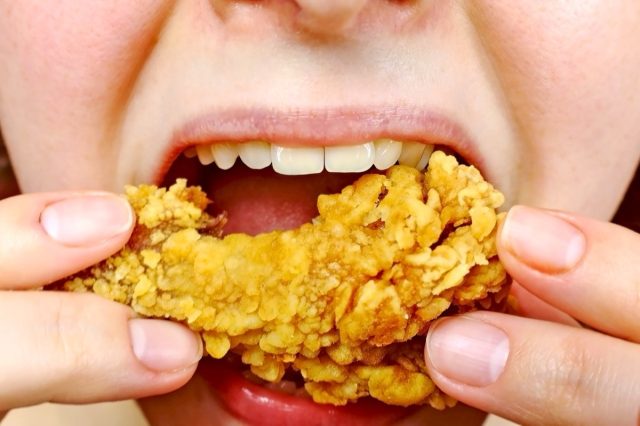
Fried foods, including chips, french fries, and fried meats, are best avoided. Dr. Zyrowski explains that these foods create "a lot of inflammatory advanced glycation end products" and oxidative stress in the body, which can lead to various health issues. Kaytee Hadley, MS, RDN, IFMCP, CPT, adds, "Fried chicken, for example, may have high protein content, but the fried food can increase levels of inflammation that may actually lead to weight gain."
Beware of Bad Fats

While healthy fats are essential, many common fats are harmful. Dr. Zyrowski advises against vegetable oils, canola oil, soybean oil, and margarine. "These fats are all inflammatory, and they lead to inflammatory conditions," he states. Instead, he recommends healthy fats like coconut oil, avocados, butter, nuts, seeds, and olive oil.
Eliminate Fast Foods
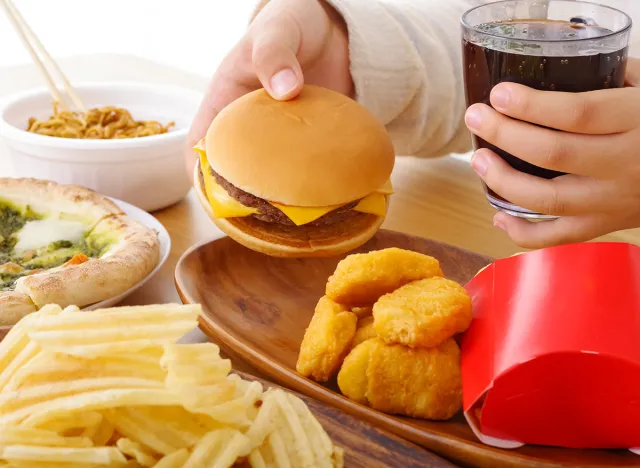
Fast foods, whether from restaurants or pre-packaged meals, are loaded with unhealthy ingredients. Dr. Zyrowski notes that these foods often contain "the sugar, the preservatives, the bad fats" mentioned earlier. Despite their convenience, he strongly advises against consuming fast foods.
Ban Artificial Flavorings, Sugars, and Dyes
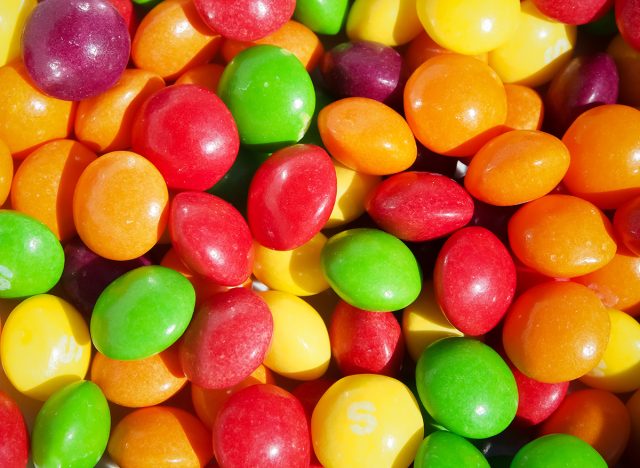
At the top of Dr. Zyrowski's list are artificial additives. "Artificial means not found in nature, made in a lab, a.k.a. fake food," he explains. These additives are often used to keep costs low and profits high, but they're linked to serious health issues, including cancer.
RELATED: I'm 70 But Look 40 Thanks to These 9 Diet Secrets
Avoid Foods with Unpronounceable Ingredients

Dr. Mark Hyman, a leading physician, advises, "First of all, if you read something on a label and you don't know what it is and you can't pronounce it, don't eat it." He gives an example: "Butylated hydroxytoluene, or BHT, is a known carcinogen that's banned in most countries except the United States."
Say No to High Fructose Corn Syrup

Dr. Hyman considers high fructose corn syrup a "hard rule" to avoid. He explains, "It's not a whole food and is a highly processed industrial food product." He warns that it can cause insulin resistance and inflammation and elevate uric acid levels.
Limit Artificial Sweeteners

Dr. Hyman also advises against artificial sweeteners. "It has a huge effect on your microbiome. It causes fermentation, bloating, distension," he explains. Dr. Jacqueline Wolf adds, "Avoid sugar alcohols (which end in -ol) such as sorbitol, mannitol, xylitol and erythritol. They cause gas and often bloating because we cannot break them down."
Be Cautious with Carbonated Beverages

Carbonated drinks can contribute to bloating. Beth Czerwony, RD, explains, "Think about what happens if you shake a can of soda. That's what is happening inside of you after you drink it. The bubbles have no place to go — and it will make you feel bloated."
Watch Out for High-Sodium Foods
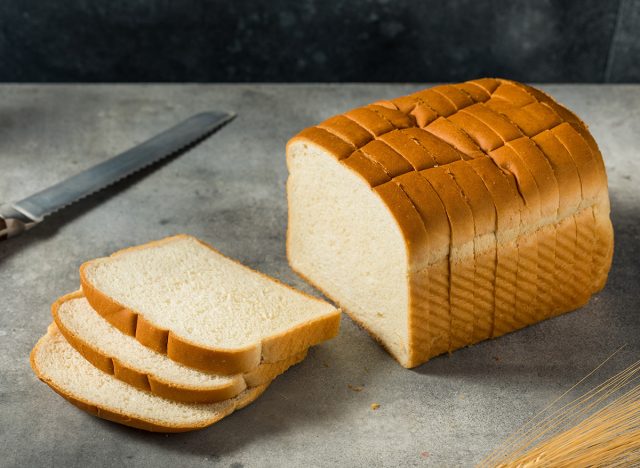
The Cleveland Clinic warns, "Eating meals that are high in sodium, high in fat or heavy with refined carbohydrates (such as bread, buns or breading) can all leave you feeling bloated."
RELATED: 9 Surprising Things That Happen When You Quit Processed Foods
Take Action: Tips for Success
Dr. Zyrowski offers practical advice for avoiding these unhealthy foods: Don't buy them, remove them from your home, be wary of misleading marketing, and always plan and prep your meals. By following these strategies, you can take control of your diet and improve your overall health.
Antoni Adamrovich, MSN, BA, APRN, FNP-C, advises, "Pack your diet with nutrient-dense foods (e.g., fruit, vegetables, lean proteins, whole grains, healthy fats, etc.). Regularly eating these types of foods will go a long way in supporting your health and well-being." And if you enjoyed this article, take advantage of these 15 Quick Ways to Lose Body Fat Percentage in a Week.




